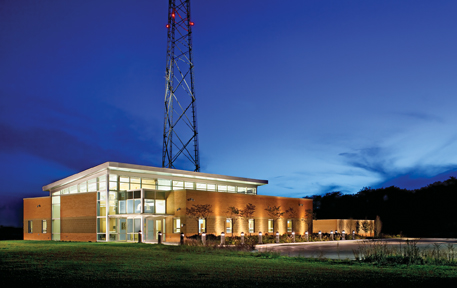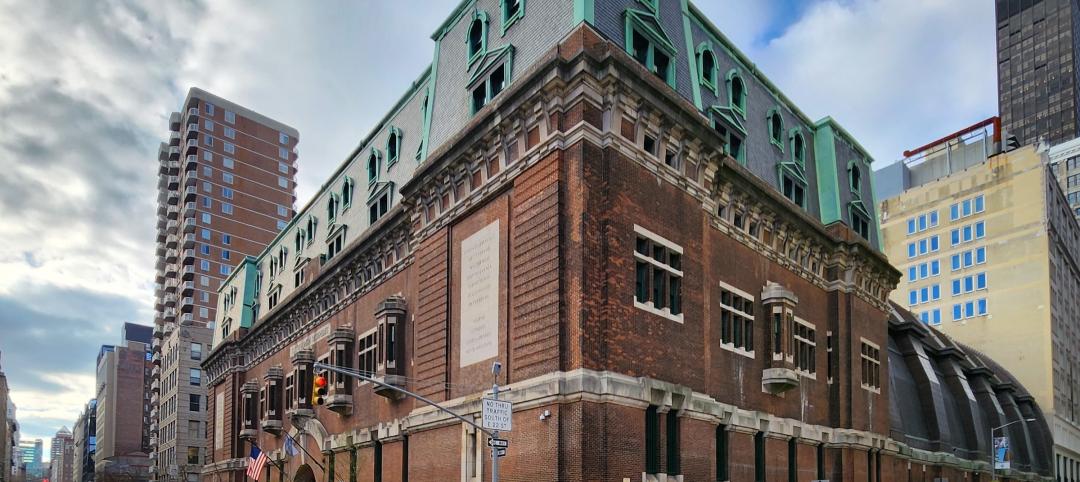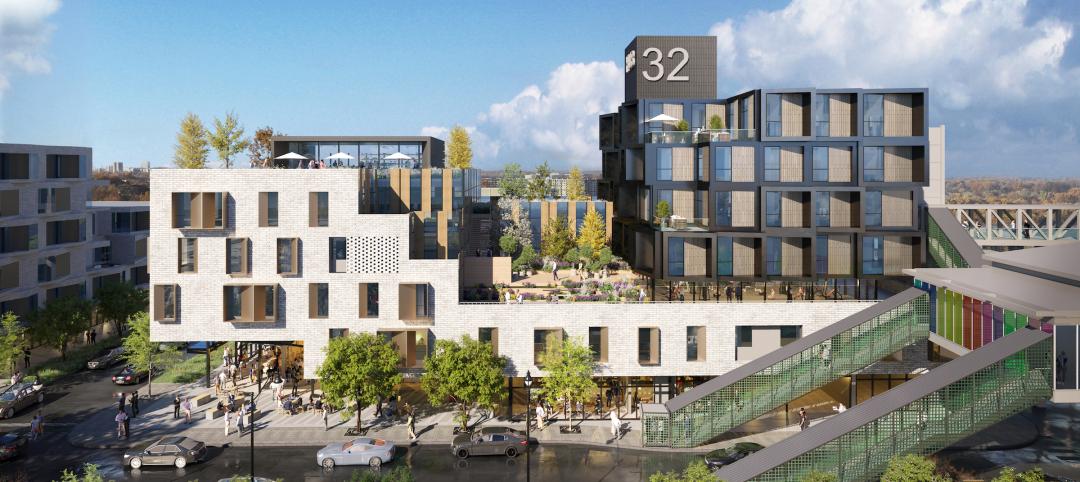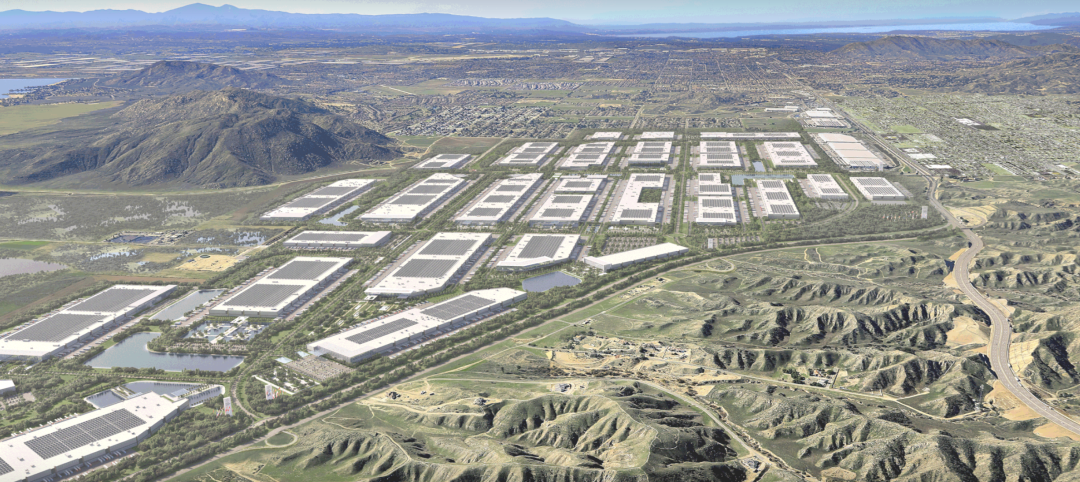Military and government clients—federal, state, and local—have been strong advocates of green building for more than a decade. They see sustainable design as vital to cost savings, as well as fulfilling their mission to minimize the impact on the environment.
On the military front, consider the New Hampshire Air National Guard Operations and Training Facility, located on the Pease Air National Guard Base at Portsmouth International Airport. The Building Team of P&S Construction (GC) and Science Applications International Corp. was able to achieve LEED Gold for the client. Sustainable strategies included minimizing solar heat gain on the roof and window exposures, installing a heat pump system, and specifying water-efficient plumbing fixtures that met maintenance requirements.
Last year, the U.S. Marine Corps Base Camp Pendleton in California became home to the first LEED Platinum U.S. Marine building, the Wounded Warrior Barracks, designed by Cass, Sowatsky, Chapman & Associates and built by Balfour Beatty via design/build delivery for the Naval Facilities Engineering Command.
This year, Balfour Beatty completed construction of two new Platinum buildings—the Wounded Warrior Headquarters Building and the Hope and Care Center (photo, page 38)—at the Wounded Warrior West Coast headquarters location at Camp Pendleton. The two buildings are expected to reduce annual water use by 84,000 gallons and provide energy savings of more than $52,000 annually.
At the federal level, the Marine Research and Education Center at the Salt River Bay National Park and History Preserve on the island of St. Croix, V.I., takes an in-depth approach to water conservation in its design.
A 60,000-sf facility dedicated to the study and education of marine ecosystems, this net-zero water and energy project will treat all wastewater on site. One hundred percent of water usage will be collected from rainwater, thus enabling the project to target both LEED Gold and at least three petals under Living Building Challenge guidelines.
Water conservation and reuse is also a major sustainable feature at the Federal Center South Building 1202 in Seattle. Designed by ZGF Architects and constructed by Heery International, the LEED Gold-targeted, 209,000-sf converted warehouse houses a 25,000-gallon concrete cistern for capturing rainwater for reuse in irrigation and toilet use throughout the facility.
At the U.S. Customs Field Operations Facility in Sells, Ariz., architectural shading and drought-tolerant and native landscaping allows for a 45% savings in water over a comparable building. The 10,092-sf expansion earned LEED Silver, thanks to the efforts of its Building Team: Green Ideas Sustainability Consultants, Davis Enterprises, Acceleration Construction Technologies, and Logan E. Van Sittert Architects.
A major contributor to that rating was the team’s prefabrication strategy. Sixty percent of the building was prefabricated offsite and delivered in 12 modular units, reducing construction waste by 89% and minimizing habitat disturbance.
The NASA Langley Research Center Headquarters in Hampton, Va., was constructed as part of Langley’s 15-year New Town Strategic Concept Plan, which is designed to create modernized facilities while developing cost-effective strategies.
Using sustainable techniques, Hill International, along with Whiting-Turner Contracting, was able to modernize the design while incorporating green products to save energy and lower costs. The team was originally shooting for LEED Gold, but was happy to learn the project had achieved Platinum status.
Builders and designers are also employing green methods for buildings at the state and local level, many of which begin on the roof.
At the Johnson County Criminalistics Lab in Olathe, Kan., a 1,100-sf vegetative roofing system sits atop the LEED Platinum building. The roof’s membrane also houses photovoltaic panels, making it an onsite renewable energy source.
A 15,000-sf 911 facility in Morris, Ill., designed and built by Wight & Co., received the 2011 Excellence in Engineering Award from the Illinois chapter of ASHRAE. The building’s only source of heating and cooling comes from a ground-loop geothermal system, where heat generated by the mission critical facility’s computer system is captured to heat the building.
In Alexandria, Va., the city’s Public Safety Headquarters was rated LEED Gold (v2.2). Pipes from the HVAC system conduct condensate into the facility’s 30,000-gallon cistern to assist with irrigation, reducing the building’s potable water use by 30%. Designed by HDR Architecture and constructed by the Whiting-Turner Contracting Co., 64% of the building is daylit, including the atrium, first-floor offices, and basement open office areas.
Sustainable design has even penetrated the wastewater industry. The King County Department of Natural Resources and Parks earned LEED Platinum for the Brightwater Environmental Education and Community Center, Woodinville, Wash.
Designed by MITHUN (with Streeter and Associates), engineered by CH2M Hill and Brown and Caldwell, and built by Hoffman Construction, the 15,0000-sf center functions on the resources generated from the adjacent wastewater treatment plant, harnessing methane for heat and using reclaimed water for toilets and irrigation.
Mortenson Construction used similar processes at the Chambers Creek Regional Wastewater Facility in Pierce County, Wash., where waste-to-energy is used to heat the plant year-round, while yielding 40 dry tons of fertilizer per week. +
Related Stories
Building Team | Mar 8, 2023
Call for Speakers: BD+C’s 2023 Women in Residential + Commercial Construction Conference
The 2023 Women in Residential + Commercial Construction conference event will take place October 25-27 in Nashville, Tenn., and will bring together more than 300 women leaders from all facets of the $1.4 trillion U.S. residential and commercial constructing sector.
Reconstruction & Renovation | Mar 8, 2023
Hoffmann Architects + Engineers receives Lucy G. Moses Preservation Award from New York Landmarks Conservancy
Hoffmann Architects + Engineers, a design firm specializing in the rehabilitation of building exteriors, announces that the historic facade rehabilitation and window replacement at the 69th Regiment Armory has been selected for the Lucy G. Moses Preservation Award, the New York Landmarks Conservancy’s prestigious recognition for outstanding preservation efforts.
Architects | Mar 7, 2023
David Chipperfield named 2023 Pritzker Architecture Prize laureate
Widely regarded as architecture's highest honor, the 2023 Pritzker Architecture Prize has been awarded to UK-based architect David Chipperfield. In honoring Chipperfield with the award, the Pritzker Prize jury cited the architect's "commitment to an architecture of understated but transformative civic presence and the definition—even through private commissions—of the public realm."
Multifamily Housing | Mar 7, 2023
Multifamily housing development in Chicago takes design inspiration from patchwork and quilting
HUB 32, a 65-unit multifamily housing development, will provide affordable housing and community amenities in Chicago’s Garfield Park neighborhood. Brooks + Scarpa’s recently unveiled design takes inspiration from the American tradition of patchwork and quilting.
Industrial Facilities | Mar 6, 2023
The largest planned logistics and business park in North America gets under way in Southern California
The $25 billion World Logistics Center will boost the supply chain capabilities of Southern California and will serve as a distribution center for destinations across the continent.
Healthcare Facilities | Mar 6, 2023
NBBJ kicks off new design podcast with discussion on behavioral health facilities
During the second week of November, the architecture firm NBBJ launched a podcast series called Uplift, that focuses on the transformative power of design. Its first 30-minute episode homed in on designing for behavioral healthcare facilities, a hot topic given the increasing number of new construction and renovation projects in this subsector.
K-12 Schools | Mar 6, 2023
Benefitting kids through human-centric high school design
Ingrid Krueger, AIA, LEED AP, shares why empathetic, well-designed spaces are critical in high schools.
Adaptive Reuse | Mar 5, 2023
Pittsburgh offers funds for office-to-residential conversions
The City of Pittsburgh’s redevelopment agency is accepting applications for funding from developers on projects to convert office buildings into affordable housing. The city’s goals are to improve downtown vitality, make better use of underutilized and vacant commercial office space, and alleviate a housing shortage.
Student Housing | Mar 5, 2023
Calif. governor Gavin Newsom seeks to reform environmental law used to block student housing
California Gov. Gavin Newsom wants to reform a landmark state environmental law that he says was weaponized by wealthy homeowners to block badly needed housing for students at the University of California, Berkeley.
Green Renovation | Mar 5, 2023
Dept. of Energy offers $22 million for energy efficiency and building electrification upgrades
The Buildings Upgrade Prize (Buildings UP) sponsored by the U.S. Department of Energy is offering more than $22 million in cash prizes and technical assistance to teams across America. Prize recipients will be selected based on their ideas to accelerate widespread, equitable energy efficiency and building electrification upgrades.

















